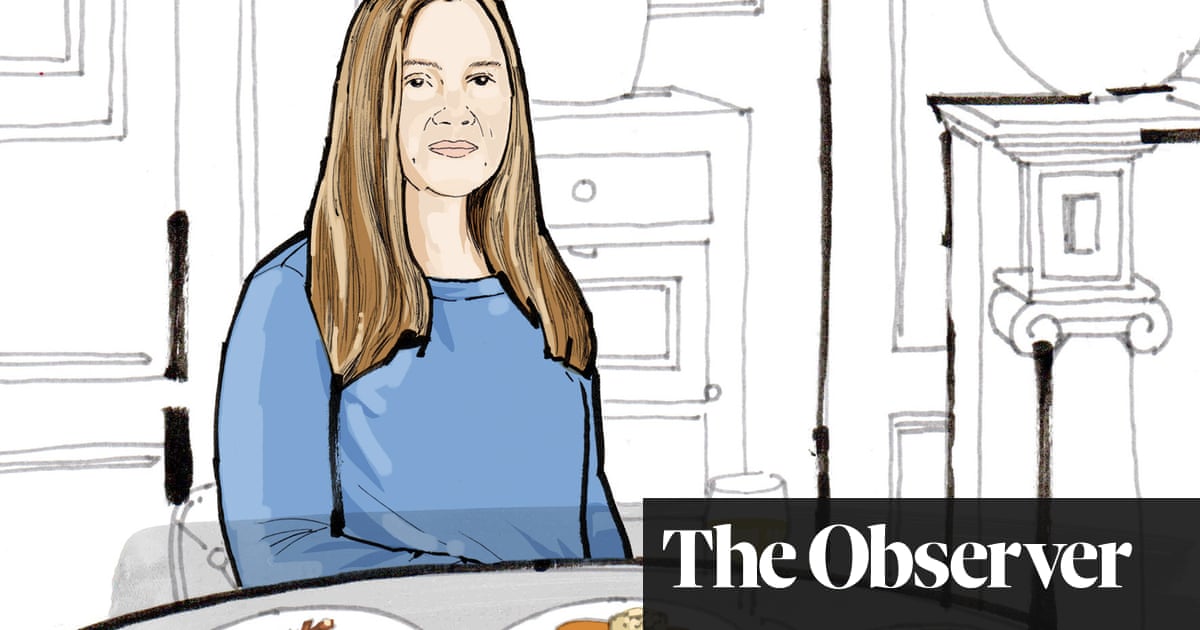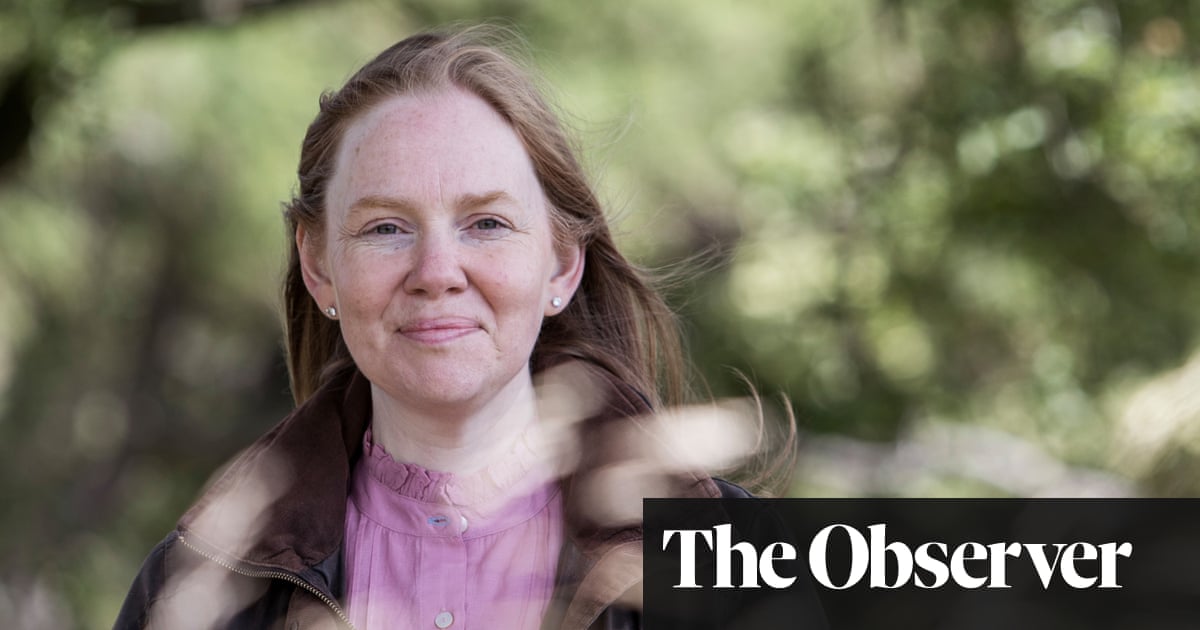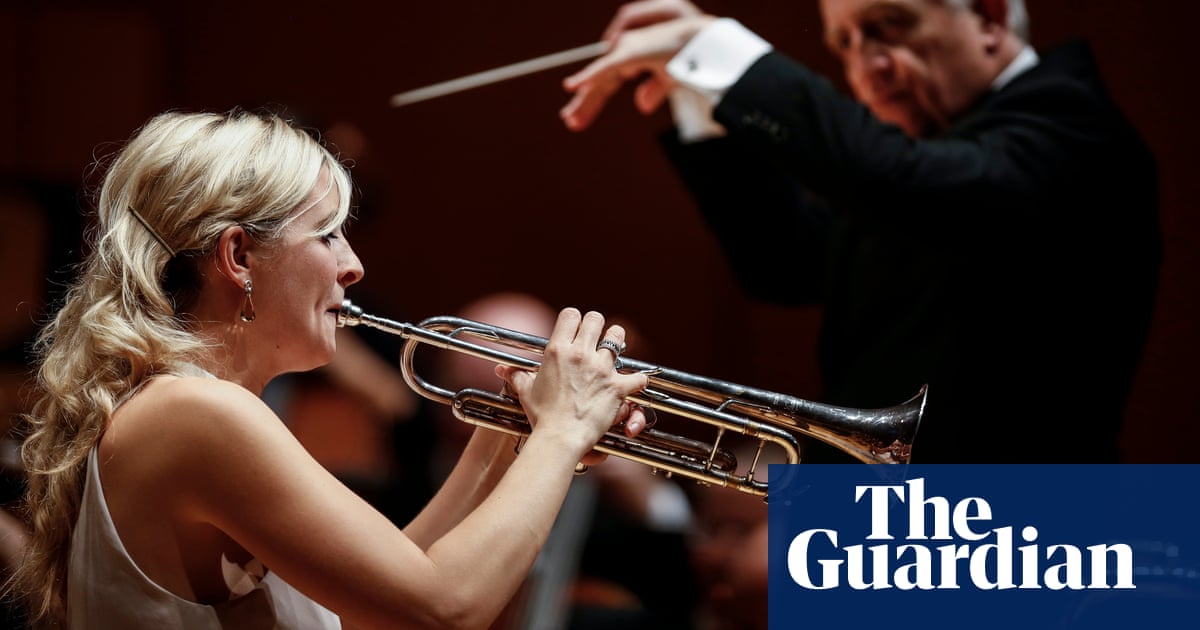
There are snow warnings pinging on my phone all the way up the M6 on the morning I drive to meet Helen Rebanks in the Lake District, but when I arrive at Pooley Bridge on the edge of Ullswater, the whiteness is confined to the tops of the fells – Glenridding and Arthur’s Pike and Helvellyn beyond – and to their reflections in the steady lake.
Rebanks has known the contours of these hills all her life. She and her husband James have their now famous farm in the next valley. I’ve been reading her book, The Farmer’s Wife, over the previous days, and walking to meet her I’m reminded of a paragraph in which she talks of forcing herself just occasionally to stop her car by the lake and take in this view as a tourist might – rather than as the scene of frantic school runs, or as a never-ending workplace, with all the anxiety and weariness of trying to keep the farm intact for another generation woven in.
She has chosen to meet in a local hotel restaurant called 1863, in part because it offers some of the best food around and in part because her elder daughter Molly, 18, has been working in the kitchen with the chef, Phil Corrie. Despite the family connection, iIt’s a vanishingly rare thing for Rebanks to come out for lunch, she says. In the decade since her husband wrote the first of his bestselling books, The Shepherd’s Life, they have had journalists from all over the world coming on pilgrimages to meet the “Herdy farmer” in his natural habitat, which has generally meant lunch in the farmhouse kitchen prepared by Helen. Her book is full of tempting recipes – beef shin stew and ham hock broth and kitchen table chicken pie – but it’s a treat, she says, to be served for once.
The food at 1863 – we’re on the lunchtime tasting menu – is a spectacular series of small plates featuring local ingredients – hen-of-the-woods on cod loin, Cumbrian lamb with Jerusalem artichoke and chive, Yorkshire rhubarb with a douglas fir flavoured yoghurt.
As these virtuoso plates come and go, Rebanks talks a bit about her motivation for telling her side of the story. It’s not that she felt left out of her husband’s accounts of their life – he always gives full credit to his wife’s fundamental, unsung role in keeping the farm and family together – more that readers have tended to romanticise that idea of the solitary shepherd in the hills. “We live in a world which is very focused on individualism,” she says. “But on a farm and in life more widely that is never the truth.” Her book is a testament to the strength – for better and worse – of marriage and family and community, to indoor as well as outdoor farm work. “The men, particularly the grandfathers in these families, are often the storytellers,” she says, “but everybody in farming families knows the importance of the farmer’s wife.”
When she sold the idea for her book, she picked Penguin to publish it because the editor she spoke to got it straight away. “I love it because it’s a book about invisible women,” the editor said and Rebanks felt the tears welling up a bit over Zoom.
To begin with the book was going to be more cosy than it turned out: recipes with anecdotes attached. When Rebanks got started she felt that would be dishonest and instead wanted to reflect the hard graft and mundane frustration of her role, the impossibly long days and sleepless nights of trying to raise four kids plus six sheepdogs, two ponies, 20 chickens, 50 cattle and 500 sheep. “I read quite a lot of memoirs,” she says, “and the ones that connect with me are when the writers let you fully into their life.”
It was a chapter about the memory of an annual ritual of making marmalade with her mother and grandmother that helped her find the voice of the book which explores, among other things, the love and tensions between family generations, their different ideas of inherited roles. When she had finished that tale, the first thing she’d written since university, she ran out and waved the paper in front of James’s nose: “I’ve written this about making marmalade!” He insisted she keep going.
She traces one theme of the book back to a day spent at Highgrove in 2017, at a Prince’s Trust event. James had been invited by the then Prince of Wales as part of a round table about the future of the land; she’d really come along as his plus one. Towards the end of the visit, the whole group sat on some straw bales in the royal barn and talked about what they had learned. When it got to Helen’s turn, she found herself saying: “Well, I’m the one who chooses what food to put on the table for our family.” As she was saying that, she recalls, she had a sudden sense of the millions of people across the country who are making those same decisions every day, and the critical role each of those choices plays in the state of the nation.
“For me, it’s about connecting the dots,” she says. “And that begins in the kitchen with cooking from scratch. People talk about cheap food, but the cost to the NHS of all these processed foods, the collective cost of their effect on physical health and mental health, the terrible cost to the soil and to the environment, that can’t keep being ignored.”
The food we are enjoying at 1863 is an extreme – and extremely delicious – example, but there has to be a recognition, she insists, of what good food is actually worth. Because we collectively have little control over mortgages or rents or fuel prices it is always the shopping basket that is targeted for savings but, without exception, weirdly cheap supermarket prices always mean “farmers are being exploited – and the land depleted”.
Before she was a farmer’s wife, Rebanks was an artist. Her speciality was embroidery with an edge. She would create beautifully crafted landscape images; only when the viewers got up close would they see pictures of natural disasters. She has a warm presence, is quick to smile, but there is clearly a toughness to her. “I’m interested in all the layers behind things, which might look pretty on the surface,” she says.
The landscape of the Lake District, celebrated for its wild grandeur, is of course – as Wordsworth portrayed – rather the expression of centuries of backbreaking human work. The dry stone walls did not build themselves. All of that is, as Rebanks argues, a way of life under gathering threat. In the past couple of decades, but especially since the empty promises of Brexit, farming families rooted in this landscape have been selling up or moving on.
“It’s often farmers that you thought would be there for generations,” she says. “In many cases they have bought into the push for bigger and bigger yields, driven by the supermarkets. They’ve borrowed money to support that model. Now the banks are putting on the squeeze and they are being undercut by cheap imports from all over the world.”
She despairs at the government’s callous indifference to that story. “We’ve obviously been closely following the farmers’ protests in Wales,” she says. “They feel absolutely abandoned.” The Rebankses have, without preaching, tried to model one sustainable future. They farm sheep and cattle in a regenerative grazing system. The farm is planned in thirds. “You graze a third, you leave a third and you trample a third. That trample is the critical bit,” she says. “It is feeding all the micro-organisms in the soil” – obviating the need for fertilisers, and ensuring a rich mix of grasses for their pedigree herd of belted Galloway cattle.
The lesson, she argues, is that there should be no separation between concerns for agriculture and for the environment. It’s the story they tell both visiting schoolchildren and MSc agronomy students from Oxford who take the lessons across the world. “We’ve worked closely with the rivers trusts and plant specialists,” she says. “It’s all about creating a thriving ecosystem. There’s so many more insects. As a result you’ve got flocks of birds rising again from those fields. The richness produces amazing quality livestock – and amazing food.”
For all their efforts, there is, as Rebanks says, no farmer these days without a side hustle. To prove the point, the final course of our lunch is a tribute to her own baking skills. A perfect little slice of tea bread that comes with our coffee. It’s something she has always made – usually two loaves, one for home and one for her dad, who loves it – and her daughter Molly introduced it to the chef here and it’s now on the menu. “Nothing fancy,” she says, “but people love it.”












